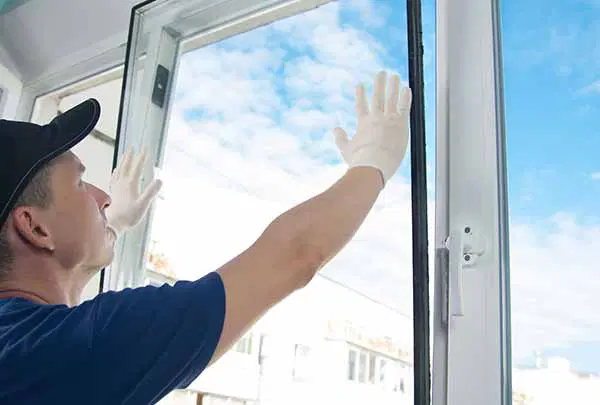Energy-conserving windows offer numerous advantages for homeowners, such as maintaining a pleasant indoor climate and reducing utility expenses. But are your current windows up to the task? If they’re around 20 years old, they might not be as effective. Here’s a guide to evaluating the performance of your current windows and what to consider when choosing window replacement Toronto.
Do 20-Year-Old Windows Conserve Energy Efficiently?
Typically, windows have a functional lifespan of around 20 years. Windows of this age are probably not as energy-efficient compared to the latest models available today. Traditionally, older windows feature a single glass pane which lacks the insulation provided by modern double-glazed windows with argon gas sandwiched between the panes.
This single-pane design does not effectively prevent heat from escaping in the winter or entering in the summer, leading to increased workload for your heating and cooling systems and, consequently, higher energy bills.
Furthermore, windows that have been in place since the house was built might show signs of deterioration such as cracks, leaks, or other damage that can diminish the window’s ability to insulate effectively and prevent external elements from entering. Older windows might also be challenging to operate. If you find that your windows are aging and no longer functioning correctly, it might be time to think about replacement.
Indicators That Your Current Windows Are Losing Efficiency
How can you determine if your old windows are inefficient? Here are several indicators to watch for:
Inconsistent indoor temperatures: If your HVAC system struggles to maintain a consistent temperature, it might be due to your windows allowing indoor air to escape or outdoor air to seep in.
Increasing energy costs: Inefficient windows force your HVAC system to work harder, which can lead to higher energy bills.
Drafts: Even when closed, if you feel air flowing through, it suggests that your window’s seals may have deteriorated or failed, permitting outside air to enter.
Condensation between panes: This indicates a breach in the window’s seal. Once the seal is compromised, insulating gas escapes and moisture accumulates, reducing the window’s energy efficiency.
Single-pane glass: Older windows typically have a single pane of glass, whereas modern windows use double panes to better insulate against heat transfer.
Improper installation: Incorrectly installed windows may not function properly, potentially leading to heat or cool air escaping from your home.
Leaks and damage: Cracks in the window can allow water to infiltrate, promoting mold and mildew growth and letting air escape.
Noticing these signs might mean it’s time to consider window restoration or replacement. Consulting with a professional window installation company can help you determine the best course of action. For homes with older windows, replacing them is often the most effective solution.
Key Features to Consider When Replacing Windows
When you’re in the market to upgrade your old or original windows, certain features can enhance energy efficiency and overall value. Look for windows that incorporate a low-emissivity (Low-E) coating, which reflects heat back outside, helping to keep your home cool in the summer.
This coating also protects against UV rays, reducing the risk of fading carpets and floors. Additionally, opt for windows that offer a warranty of at least 10 years, as these tend to provide greater longevity and better performance than those with shorter warranties.
It’s also wise to consider the window’s Solar Heat Gain Coefficient (SHGC), ENERGY STAR certification, and the number of glass panes.
Understanding Solar Heat Gain Coefficient (SHGC)
SHGC is a measure of how much solar energy is transmitted through a window. The rating ranges from 0 to 1, and a lower SHGC means the window is more effective at blocking heat from the sun. Selecting windows with a low SHGC rating can help keep your home cooler during warm months, reducing the burden on your HVAC system and potentially lowering your energy bills.
Energy Efficiency Rating
An ENERGY STAR rating signifies that a window meets stringent energy efficiency criteria established by the U.S. Environmental Protection Agency (EPA). Products that earn this rating are manufactured by ENERGY STAR partners and have undergone independent testing and certification by the National Fenestration Rating Council (NFRC). Choosing windows with an ENERGY STAR rating ensures you are investing in high-quality, energy-efficient products.
Double Pane Windows
For window replacements, consider models with multiple glass panes. Unlike single-pane windows, which consist of one glass layer, double-pane windows feature two layers of glass with a space in between, usually filled with an insulating gas.
This arrangement enhances thermal insulation, helps in temperature regulation, and provides a buffer against noise. Upgrading from single to double or even triple-pane windows can significantly reduce your home’s energy consumption and boost energy savings.
Advantages of Upgrading Older Windows
Upgrading your windows can bring numerous benefits, starting with enhanced energy efficiency. Newer windows boost your home’s insulation, easing the workload on your HVAC system to maintain a consistent temperature.
This not only decreases energy consumption but also cuts down on energy bills. For many homes, replacing windows can result in energy savings of 15-25% annually. If you’re aiming to adopt more eco-friendly practices, updating your windows is an excellent initiative.
Beyond energy savings, new windows can also enhance the appearance, safety, and functionality of your home. They improve curb appeal, making your home look fresher and more appealing. Additionally, replacing windows can boost your property’s market value, often allowing you to recoup about 70% of your investment.
Modern windows come equipped with features that can enhance security, such as locks that cannot be opened from the outside and other protective measures. They also offer better sound insulation, reducing the amount of external noise that enters your home.
Seeking Professional Window Installation
When upgrading to more efficient windows, employing professional installers ensures that your new windows are correctly fitted and fully operational. Choose a company known for its high-quality products and skilled installation team to maximize the lifespan of your new windows.

